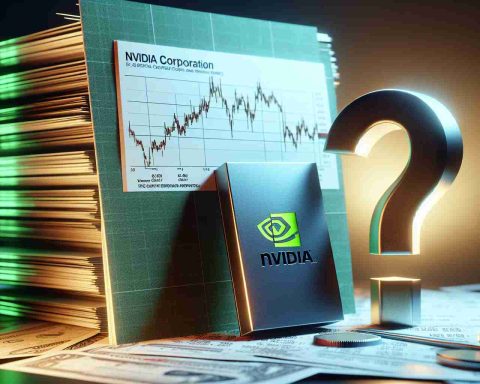The Next Wave of Technological Innovators
In the quest for profitable investments, the future belongs to pioneering tech companies making groundbreaking strides. As societal needs evolve, five powerhouses emerge as critical players poised for significant growth.
Nvidia is leading the charge in artificial intelligence, boasting a remarkable projected annual growth rate of 20%. Its latest compact AI supercomputer aims to diversify into robotics, opening new avenues in this dynamic sector.
Alphabet, the parent company of Google, is forging ahead with advancements in autonomous driving technology and quantum computing. Its vast infrastructure in cloud services further solidifies its dominance, predicting robust growth across multiple sectors.
Netflix remains a formidable competitor in the streaming arena, with a massive global subscriber base nearing 283 million. The introduction of advertising options and innovative content formats reflects its adaptability to changing consumer demands.
Amazon maintains its stronghold in e-commerce while expanding successfully into the cloud computing domain with AWS. The company’s diverse offerings in telehealth and smart home technologies ensure its future growth trajectory remains bright.
Microsoft continues to thrive through its dominance in cloud services and AI integration. With Azure at its core, Microsoft’s commitment to evolving technology places it strategically for ongoing success.
Investing in these visionary companies today sets the stage for potential financial triumphs tomorrow.
The Broader Implications of Technological Innovation
The rise of pioneering tech companies like Nvidia, Alphabet, Netflix, Amazon, and Microsoft extends beyond mere financial gain; it reflects a profound shift in societal dynamics and cultural paradigms. As technology permeates our daily lives, it shapes how we communicate, consume content, and even perceive our roles within the economy. The emphasis on artificial intelligence by leaders like Nvidia is not only enhancing productivity but also triggering discussions surrounding job displacement and the future of work. As automation becomes more prevalent, workers must adapt, leading to a pressing need for comprehensive reskilling initiatives.
Furthermore, the ambitions of these giants often transcend local borders, impacting the global economy. The investment in quantum computing by companies like Alphabet signifies a potential leap forward in processing capabilities, which could have ramifications for industries such as healthcare, finance, and logistics. This technological arms race may create a new economic landscape where innovation drives competition and shapes international relations.
However, the environmental implications cannot be ignored. The expansion of cloud computing services requires significant energy resources, prompting a critical industry debate about sustainability and carbon footprints. As companies endeavor to balance growth with ecological consciousness, the integration of green technologies may define the next wave of innovation.
In conclusion, as society stands at the crossroads of technological advancement, the emphasis on innovation carries long-term significance for our economy, culture, and environment, necessitating a collective response to harness these changes responsibly.
Discover the Future: Top Tech Titans Shaping Tomorrow’s Innovations
The Next Wave of Technological Innovators
As we navigate the ever-evolving landscape of technology, a few companies stand out as frontrunners in innovation and growth. The future of technological investment is being molded by these pioneering firms, each contributing to groundbreaking advancements that respond to the evolving demands of society.
Key Players in Technological Advancement
Nvidia is not just leading in artificial intelligence but is also making strides in sectors previously untapped by its capabilities. Its latest initiatives include creating high-performance GPUs tailored for machine learning and deep learning applications, which are essential for data-intensive tasks in various industries such as healthcare and finance. Moreover, Nvidia’s foray into the gaming and entertainment industries with its offerings in cloud gaming through GeForce NOW is widening its appeal and market reach.
Alphabet, the parent company of Google, is significantly investing in sustainable technology practices alongside its pursuit of advances in autonomous vehicles and quantum computing. The company’s commitment to achieving carbon-free energy for its data centers by 2030 is a testament to its dedication to sustainability. Additionally, Alphabet’s rapid expansion in artificial intelligence through tools like Bard exemplifies its focus on integrating AI into everyday applications.
Netflix continues to adapt by exploring interactive content and gaming offerings, expanding beyond traditional streaming to satisfy diverse viewer preferences. Its investment in producing original films and series, coupled with the introduction of regional content, enhances its global footprint and maintains viewer engagement. The company’s strategic move into gaming suggests a robust approach to retaining subscribers in an increasingly competitive landscape.
Amazon is clearly diversifying its portfolio, emphasizing a shift towards renewable energy in its operations as part of its commitment to sustainability. The company’s investments in electric delivery vehicles and solar energy projects reflect an effort to not only enhance its logistics capabilities but also minimize its environmental impact. Furthermore, its foray into healthcare platforms highlights Amazon’s strategic intent to capitalize on the intersection of technology and wellness.
Microsoft is leveraging its stronghold in cloud computing through Azure, promoting innovation in various fields, including cybersecurity and hybrid work solutions. Its focus on providing robust security features for its cloud offerings comes at a crucial time when organizations are increasingly vulnerable to cyber threats. Additionally, Microsoft’s acquisition strategy, including companies that excel in AI and productivity software, positions it well for future market leadership.
Pros and Cons of Investing in Tech Innovators
Pros:
1. Growth Potential: These companies are at the forefront of technological advancement, indicating robust growth trajectories.
2. Diverse Portfolios: Their expansion into various sectors, such as gaming, healthcare, and sustainability, provides multiple revenue streams.
3. Market Leadership: Being leaders in innovation, they hold significant competitive advantages in their respective fields.
Cons:
1. Market Volatility: The tech industry can be subject to rapid changes and economic instability, impacting stock performance.
2. Regulatory Challenges: Increased scrutiny and regulation in sectors like data privacy and antitrust may pose challenges.
3. Competitive Landscape: Continual innovation is crucial, and emerging startups could disrupt established players.
Insights into Future Trends
The market continues to trend towards the integration of sustainable practices as consumers demand more environmentally friendly products and services. Companies embracing this shift are likely to benefit in both brand loyalty and market share. Additionally, the growing reliance on AI and machine learning across industries indicates an increasing need for skilled professionals, driving innovation in educational programs and training initiatives.
Conclusion
Investing in these innovative tech companies not only aligns with growth expectations but also fulfills the increasing demand for sustainable and adaptable technology solutions. As they continue to navigate challenges and leverage opportunities within their sectors, these tech titans are well-positioned to shape the future of technology and investment.
For more insights into tech innovations and investment opportunities, visit TechCrunch.























